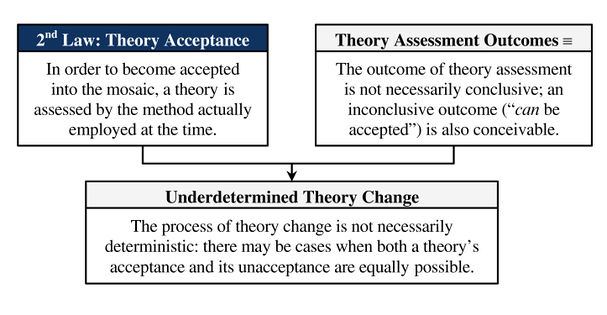Underdetermined Theory Change theorem (Barseghyan-2015)
This is an answer to the question Determinism vs. Underdeterminism in Scientific Change that states "The process of theory change is not necessarily deterministic: there may be cases when both a theory's acceptance and its unacceptance are equally possible."
Underdetermined Theory Change theorum was formulated by Hakob Barseghyan in 2015.1 It is currently accepted by Scientonomy community as the best available answer to the question.
Contents
Scientonomic History
Acceptance Record
| Community | Accepted From | Acceptance Indicators | Still Accepted | Accepted Until | Rejection Indicators |
|---|---|---|---|---|---|
| Scientonomy | 1 January 2016 | The theorem became de facto accepted by the community at the time together with the whole theory of scientific change. | Yes |
Question Answered
Underdetermined Theory Change theorem (Barseghyan-2015) is an attempt to answer the following question: Is the process of scientific change a strictly deterministic process? Will two unconnected communities experience a similar historical series of changes in their individual mosaics?
See Determinism vs. Underdeterminism in Scientific Change for more details.
Description
The process of theory assessment under the TSC is underdetermined for two reasons. First, only theories that are constructed are available for assessment. Whether or not a theory is ever constructed is, at least partly a matter of creativity, and is therefore outside the scope of the TSC. Second, it is at least theoretically possible that a process of theory assessment will be inconclusive. This might be because the requirements of the method employed at the time might be vague (e.g. Aristotelian requirements of "intuition schooled by experience").1p. 199-200
Reasons
No reasons are indicated for this theory.
If a reason supporting this theory is missing, please add it here.
Questions About This Theory
There are no higher-order questions concerning this theory.
If a question about this theory is missing, please add it here.

